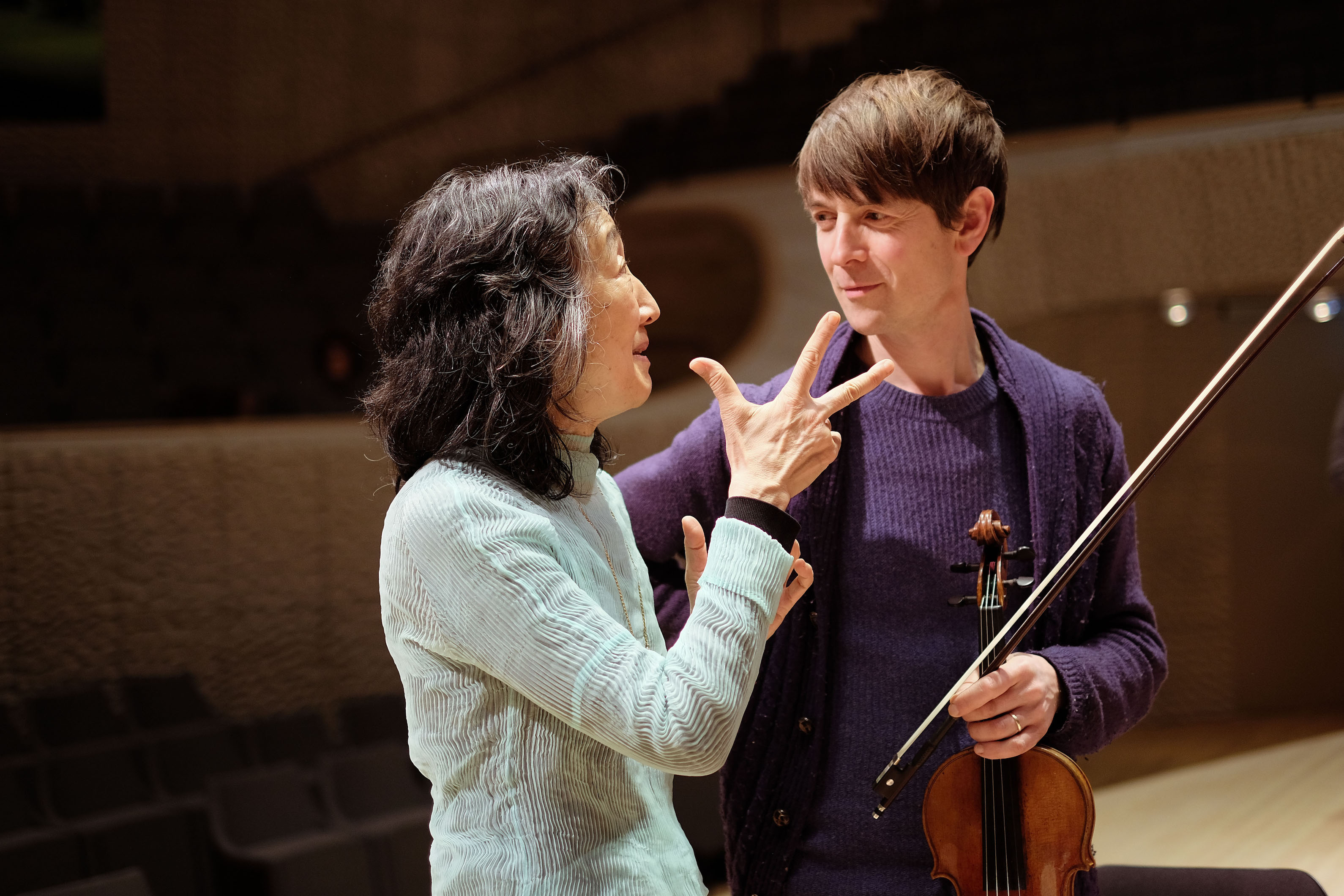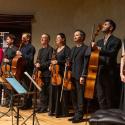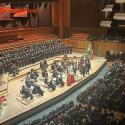When a pianist directs from the keyboard, the result can be a sedate affair: a matter of minimalist time-keeping while the soloist shows his or her fancy moves. Not so with Dame Mitsuko Uchida and her long-term partners, the Mahler Chamber Orchestra. Clad in a sort of blue magician’s gown over severe black, Uchida – who has just turned 70 – stood to conduct, vigorously, the opening passages of last night’s two Mozart concertos at the Royal Festival Hall. Even when safely back on her stool, she frequently indicated every sign of wanting to leave it as her arms – when not otherwise occupied – stretched and wheeled first towards one section of the orchestra, now another.
These expansive open-handed gestures coaxed some sublime responses from this first-order band. Yet you sense that an outfit as tight and polished as the Mahlers – with their members drawn from a dozen different countries – might have played nearly as well even with more reticent direction. The point is that they moulded their sound around Uchida’s often exquisite performance even when she had no time for all that sorcerer’s semaphore. In the 1926 string-orchestra version of Berg’s Lyric Suite, which supplied the gourmet filling to separate last night's two slices of Mozart, the MCO’s leader Matthew Truscott gently took command to prove that this ensemble can dazzle without stars.
That said, Uchida and the Mahlers have forged a durable liaison in which neither party shows any sign of taking the other for granted. The rapport on display at the RFH was often thrilling, with Uchida in perpetual merry dialogue with the jauntily brilliant woodwinds facing her Steinway, while swivelling left and right to spin endless moments of finely-staged drama from the ever-alert strings. They began with a genial and robust rendering of the F major concerto, No. 19, a (mostly) happy piece showcased with a sunlit relaxation that never drifted into complacency.
Uchida’s sheer refinement and chiselled clarity of tone may go without saying; but the two cadenzas here allowed her to visit more spontaneous and animated regions, stretching tempi that once or twice did threaten to become slightly predictable. Yet the piano’s witty, sophisticated to-and-fro with flute (the consistently fine Chiara Tonelli) and bassoons (Fredrik Ekdahl and Chiara Santi) proved – here as in the second concerto – a conversation to cherish. This account may initially have lacked a flicker of fire. But in the closing Allegro, the exuberant catch-me-if-you-can chase of the orchestral counterpoint and the piano’s frolicsome runs and trills made for a spirit-lifting farewell – ruined, as so often these days, by premature applause.
 Something completely different, Berg’s Lyric Suite – or rather, the three movements that he arranged for string ensemble – allowed Truscott (pictured above with Mitsuko Uchida by Geoffroy Schied) and his colleagues to cultivate a darker but no less compelling tone. Their combination of fervour and finesse brought to mind the strings of much more venerable bands – the MCO itself dates only from 1997. They stood up for this soaring but anguished heart-to-heart. In it Berg, supposedly an apostle of austere musical abstraction, coded an unhappy love with all the confessional intensity – albeit disguised – of an earlier, more romantic, age. Berg’s passionate serialism (not a paradox in this case) calls for an uncommon combination of intimacy and lucidity.
Something completely different, Berg’s Lyric Suite – or rather, the three movements that he arranged for string ensemble – allowed Truscott (pictured above with Mitsuko Uchida by Geoffroy Schied) and his colleagues to cultivate a darker but no less compelling tone. Their combination of fervour and finesse brought to mind the strings of much more venerable bands – the MCO itself dates only from 1997. They stood up for this soaring but anguished heart-to-heart. In it Berg, supposedly an apostle of austere musical abstraction, coded an unhappy love with all the confessional intensity – albeit disguised – of an earlier, more romantic, age. Berg’s passionate serialism (not a paradox in this case) calls for an uncommon combination of intimacy and lucidity.
As the two groups of violins faced off in their strenuous quarrel that occasionally resolved into concord, Truscott and friends delivered exactly that. Quietly proactive as a leader, he also made his own, wistful solos glow. The strings wrung every drop of curdled sensuality from this music: the nightmare fragments of waltz in the first “amoroso” movement: the spine-tingling scurry of night creatures – pianissimo, pizzicato – in the “misterioso” central section; and the almost Mahlerian themes of transcendent yearning and resignation in the “appassionato” finale. At the close, Truscott’s own violin voice sang out again with all the bittersweet melancholia that this haunting piece requires.
Almost as if Berg had darkened the mood by himself, Uchida returned after the interval with the sombre and stormy D minor concerto, No. 20 – unsurprisingly, the only Mozart concerto that Beethoven publicly performed. With oboes and flute as her assured accomplices, she spun the eerie allegro into a sinister web of sound – a restrained turbulence, but quietly menacing. Elegant, not bloodless, her sensitively pedalled playing may have lacked a little of the proto-Romantic agitation that some pianists find here. Still, it never lost touch with the whiff of terror (this is the key of the Requiem, after all) Mozart imparts. The cadenza opened the door to a dreamy slo-mo interlude which prepared the ground for the middle-movement Romanze. This section really brought out the best in Uchida’s approach, its lyrical skip and saunter allied to a rhythmic sprightliness that always kept us on our toes. Her subtle rubato touches complemented the exceptional creaminess of the MCO strings.
Uchida’s sweeping, soaring arms conjured more magic in the final rondo, abetted again by the skittish, mischievous flute, bassoons and oboes opposite her. Those who find Uchida’s Mozart a little on the understated side would have found plenty of uplift and exhilaration here, along with some nicely judged surprises in the tempi. If most of the packed RFH would have come for the beloved soloist – who, as ever, amply rewarded their devotion – the beautifully calibrated dialogue with the MCO adds an extra dimension to her musical world. As for the ravishing Schubert encore (from the G major sonata), it hinted at another of Uchida’s home planets, waiting to be explored once again.














Add comment